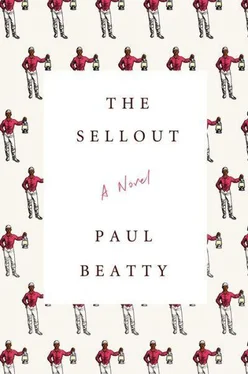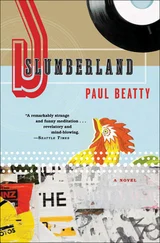So when Hominy, the stoop-shouldered epitome of obsequiousness, stood up and made that face, everyone on board felt like they, too, had a white person next to them baring their forearms and wanting to compare tans after they’ve returned from a Caribbean vacation. Felt like Asians being asked, “No, where are you from originally?” Like Latinos being asked for proof of residency and big-chested women being asked, “So are those real?”
It wasn’t until Marpessa noticed that the unknown white woman completed the three-hour round-trip from El Segundo Plaza to Norwalk and back again that she began to get suspicious, but by then it was too late. The bus was nearly empty and her shift was almost over.
“You know her, don’t you?”
“No, I don’t.”
“And I don’t believe you.” Marpessa popped her gum and picked up the in-dash microphone, filling the bus with amplified derision. “Miss. Excuse me, would the lady with the strawberry-blond hair who was preternaturally comfortable with a literal busload of niggers and Mexicans (and by ‘Mexicans’ I mean all people. Central, South, North, and whatever Americas have you, native-born and otherwise), please approach the front of the bus. Thank you.”
The dusk lowered itself onto El Porto Harbor, and as the white woman sauntered down the aisle, the sunlight decanted itself through the front windshield and into the bus in blinding streaks of overlapping purple and orange hues, lighting her up like a beauty pageant winner. I hadn’t noticed how pretty she was. Too pretty. It wouldn’t be hard to argue that Hominy gave up his seat, not because she was white, but because she was so fucking fine, and that notion had me reassessing the entire civil rights movement. Maybe race had nothing to do with it. Maybe Rosa Parks didn’t give up her seat because she knew the guy to be unapologetically gassy or one of those annoying people who insists on asking what you’re reading, then without prompting tells you what he’s reading, what he wants to read, what he regrets having read, what he tells people he’s read but really hasn’t read. So like those high school white girls who have after-school sex with the burly black athlete in the wood shop, and then cry rape when their fathers find out, maybe Rosa Parks, after the arrest, the endless church rallies, and all the press, had to cry racism, because what was she going to say: “I refused to move because the man asked me what I was reading”? Negroes would’ve lynched her.
Marpessa looked at me, then at her lone white passenger, then back at me, and stopped the bus in the middle of a busy intersection, flinging open the doors with all the civil servant courtesy she could muster. “Everybody who I don’t know personally, get the fuck off the bus.” “Everybody” being a lazy skateboarder and two kids who’d spent the past hour necking like twisted rubber bands in the back, who quickly found themselves in the middle of Rosecrans Avenue holding free transfer tickets that flapped uselessly in the sea breeze. Miss Freedom Rider was about to join them when Marpessa blocked her passage like Governor Wallace blocked the entrance to the University of Alabama in 1963.
In the name of the greatest people that have ever trod this earth, I draw the line in the dust and toss the gauntlet before the feet of tyranny, and I say segregation now, segregation tomorrow, segregation forever.
“What’s your name?” Marpessa asked as she cajoled the bus northbound onto Las Mesas.
“Laura Jane.”
“Well, Laura Jane, I don’t know how you know this fertilizer-smelling fool right here, but I hope you like to party.”
Unlike those expensive, staid, day-trip excursions to Catalina Island, the impromptu four-wheel birthday party cruise up the Pacific Coast Highway was free and jumping like a motherfucker. Our highway-next-to-the-ocean-liner had all the amenities: Open bar. Stomped-on aluminum can, whisk-broom shuffleboard. Casino gambling, which consisted of pitching pennies, dominoes. A coin-flip game called Get Like Me, and a disco lounge. Captain Marpessa womaned the helm, drinking and cursing like a pissed-off pirate. I filled in as First Mate, Purser, Deck Hand, Bartender, and DJ. We’d picked up some more passengers on the way when the bus pulled into the Jack in the Box drive-thru across the street from Malibu pier, cranking Whodini’s “Five Minutes of Funk,” and when we ordered fifty tacos and a shitload of sauce, the entire night shift quit on the spot and climbed aboard, aprons, paper hats, and all. If I had pen and paper and the bus had a bathroom, I would’ve posted another sign — ALL EMPLOYEES MUST WASH THEIR HANDS AND THEIR MINDS BEFORE RETURNING TO THEIR LIVES.
After night falls, once past Pepperdine University, where the highway narrows into a two-lane hill that stretches like a skate ramp to the stars, there isn’t much light. Just the occasional flash of oncoming high beams, and, if you’re lucky, a lonely bonfire on the sand, and the sheets of moonlight give the Pacific Ocean a glassy black obsidian sheen. It was on this same stretch of winding road that I first courted Marpessa. I bussed her on the cheek. She didn’t flinch, which I interpreted as a good sign.
Although the bus cruise was bumping, Hominy had spent most of the ride standing in the middle of the dance floor, stubbornly holding on to the overhead bar and, by proxy, the history of American discrimination, but around Puerco Beach, Laura Jane had managed to coax him out of his ancient mindset by grinding her pelvic bone rhythmically against his backside and playing with his ears. “Freaking,” we used to call it, and she pranced around Hominy, her hands overhead, caressing the beat. When the song ended, she shouldered her way toward the bow, the fuzz on her upper lip beaded with sweat. Goddamn, she was fine.
“Wicked party.”
The radio buzzed to life, and a dispatcher said the word “whereabouts” in a concerned voice. Marpessa turned down the music, said something I couldn’t hear, then blew a kiss into the receiver and switched off the radio. If New York is the City That Never Sleeps, then Los Angeles is the City That’s Always Passed Out on the Couch. Once past Leo Carrillo, PCH begins to smooth out, and when the moon disappears behind the Santa Monica Mountains, painting the night sky pitch-black, if you listen closely you can hear two faint pops in fairly quick succession. The first is the sound of four million living-room television sets flickering off in unison, and the second is the sound of four million bedroom ones being powered on. Moviemakers and photographers often speak of the uniqueness of L.A. sunlight, the ways it pours itself across the sky, golden and sweet, like Vermeer, Monet, and breakfast honey all rolled into one. But the L.A. moonlight, or lack thereof rather, is just as special. When night falls, I mean really falls, the temperature drops twenty degrees and a total amniotic blackness blankets and comforts you like a lover making the bed while you’re still in it, and that brief moment between television sets popping off and back on is the calm before the after-hours strip clubs in Inglewood open, before the cacophony of New Year’s Eve gunshots rings out, before Santa Monica, Hollywood, Whittier, and Crenshaw Boulevards come slowly cruising to life, is when Angelenos take time to pause and reflect. To give thanks to the late-night joints in Koreatown. To Mariachi Square. To chili burgers and pastrami dip sandwiches. To Marpessa, peering through the windshield and squinting at the stars, driving by dead reckoning rather than simply following the road. The tires ground assuredly over the asphalt, the bus rolling through the stratosphere, and when she heard the second pop, Marpessa gave the go-ahead for more music, and before long, Hominy and the rest of the Jack in the Box ballet were again pirouetting in the aisle, singing out loud to Tom Petty.
Читать дальше












